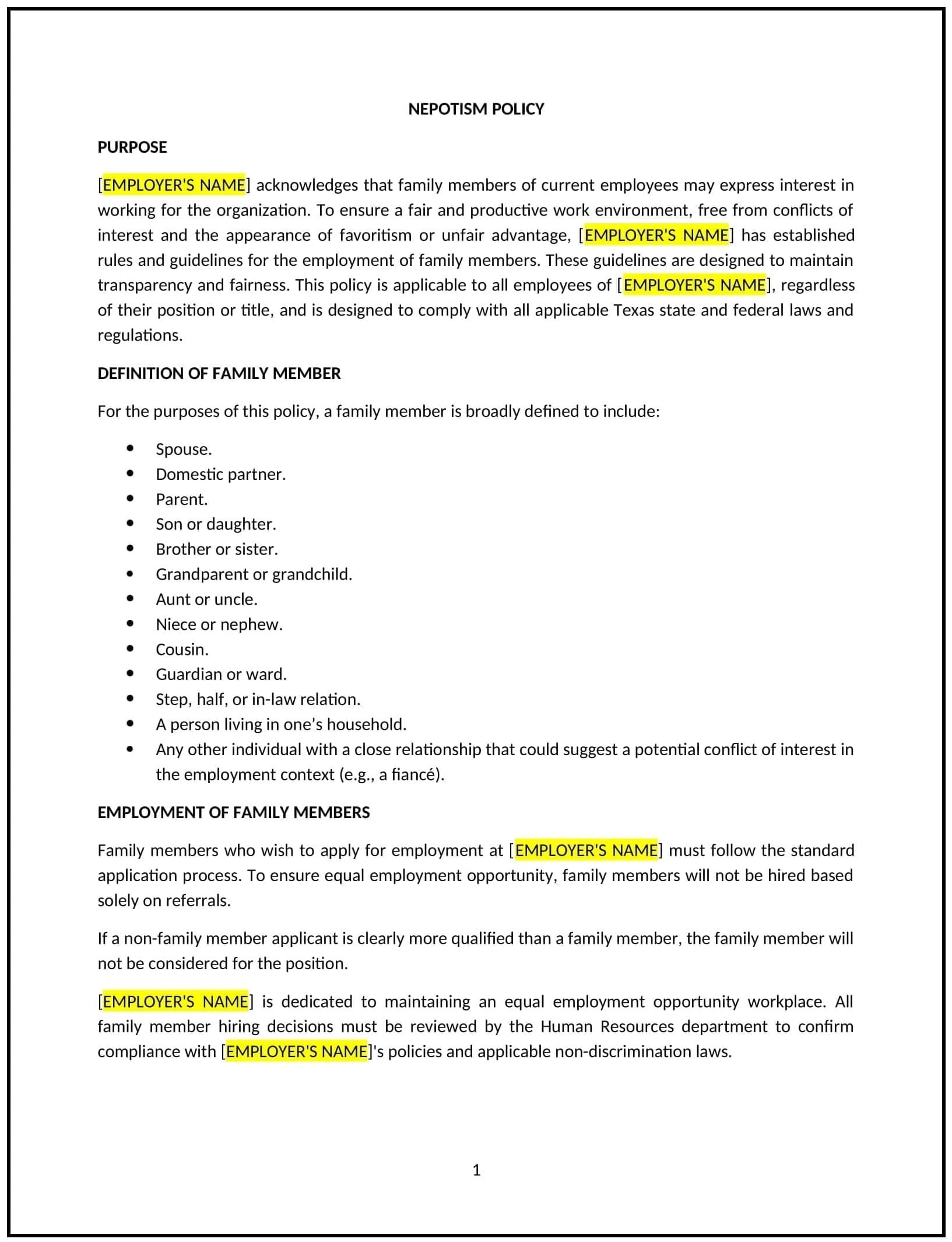Got contracts to review? While you're here for policies, let Cobrief make contract review effortless—start your free review now.

Customize this template for free
Nepotism policy (Texas)
This nepotism policy is designed to help Texas businesses establish clear guidelines for hiring, promoting, and managing employees who have close personal relationships, such as family members or romantic partners, working within the organization. The policy aims to ensure fairness, transparency, and equal opportunity for all employees while avoiding potential conflicts of interest and favoritism.
By adopting this policy, businesses can foster a more professional and equitable work environment, reduce the risk of bias or perceived bias, and promote compliance with both Texas state laws and federal regulations regarding workplace discrimination.
How to use this nepotism policy (Texas)
- Define relationships covered by the policy: Clearly outline the relationships that are considered family members or close personal relationships, including spouses, children, parents, siblings, domestic partners, and in-laws.
- Set guidelines for hiring and promotion: Specify whether family members or close personal relationships are allowed to work in the same department or team, and under what circumstances. The policy should clarify how such decisions are made fairly, with transparency, and without favoritism.
- Address direct supervision: Establish whether employees can directly supervise or be supervised by family members, and outline any restrictions on reporting relationships to prevent conflicts of interest or perceptions of favoritism.
- Implement disclosure requirements: Require employees to disclose any relationships that may fall under the nepotism policy, particularly when family members or close personal relationships are involved in the hiring, promotion, or supervision process.
- Clarify conflict resolution procedures: Provide guidance on how to address potential conflicts of interest or concerns arising from personal relationships at work. The policy should specify a process for handling any issues that arise, such as reassignment or independent reviews by HR.
- Prevent discriminatory practices: Emphasize that the policy’s goal is to prevent discrimination and ensure that all employees have equal opportunities for employment, promotion, and fair treatment.
Benefits of using this nepotism policy (Texas)
This policy offers several benefits for Texas businesses:
- Promotes fairness and transparency: By setting clear rules for family relationships at work, businesses ensure that all employees are treated fairly and that hiring and promotion decisions are based on qualifications, not personal relationships.
- Reduces the risk of favoritism: The policy helps prevent the appearance of favoritism or biased decision-making that can arise when family members or close personal relationships are involved in the workplace hierarchy.
- Protects employee morale: Employees are more likely to feel valued and respected when they know that hiring and promotion decisions are based on merit, not personal connections. This fosters a positive workplace culture and can help reduce turnover.
- Improves legal compliance: This policy improves compliance with anti-discrimination laws by preventing situations where nepotism could result in discriminatory practices or claims of unfair treatment.
- Improves organizational effectiveness: By maintaining clear, consistent practices for managing relationships in the workplace, businesses can ensure that operations run smoothly and that decisions are made in the best interest of the company.
Tips for using this nepotism policy (Texas)
- Communicate the policy clearly: Ensure that all employees are aware of the nepotism policy, particularly when it comes to hiring, promotions, and supervision. This can be included in the employee handbook or discussed during onboarding.
- Regularly monitor compliance: Review any hiring or promotion decisions involving family members or close relationships to ensure they are compliant with the policy. Monitor the workplace to identify any potential conflicts of interest or perceptions of bias.
- Establish a clear process for reporting concerns: Employees should know how to report any potential nepotism-related concerns, and the process should be transparent and fair. Consider appointing a neutral third party, such as HR, to investigate and address any issues.
- Apply the policy consistently: Ensure that the policy is applied consistently across all departments and positions. Family relationships should not be treated differently depending on the employee’s role or status within the company.
- Review regularly: Periodically review and update the policy to ensure it remains aligned with Texas state laws, federal regulations, and evolving company needs.